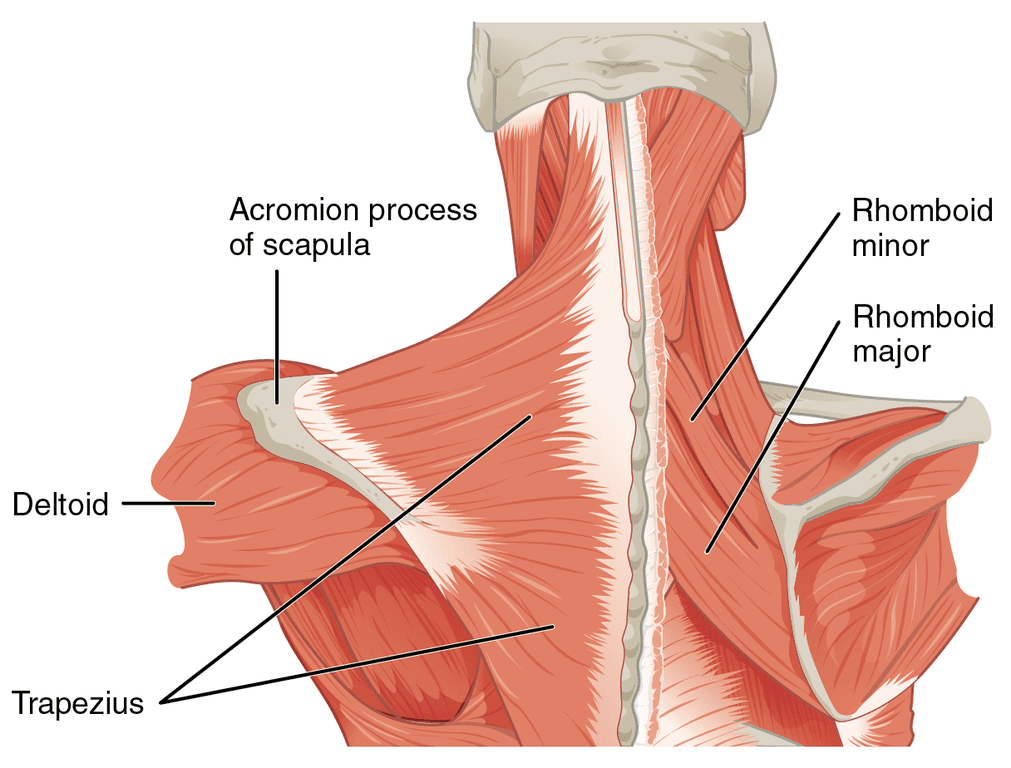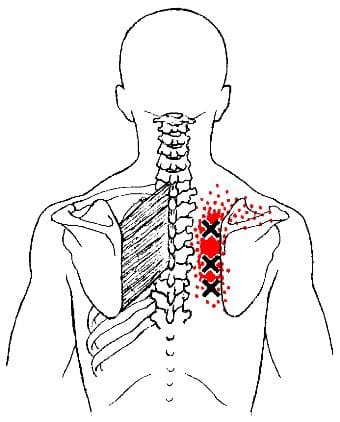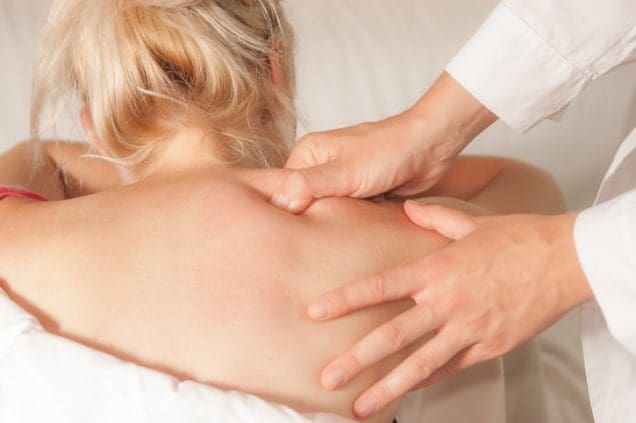Table of Contents
Introduction
Many individuals do not realize they are in pain until they begin to feel symptoms of stiffness or tenderness in certain areas of their body. Many people have two most common complaints: back and shoulder pain. The shoulder and the back have a casual relationship that stabilizes the upper body and protects the spine’s thoracic region. When injuries or ordinary factors affect not only the shoulders but the back, it can lead to symptoms of pain and stiffness along the muscles, causing the development of trigger points along the upper back and shoulder muscles. One of the muscles affected by trigger points is the rhomboid muscles located in the upper back behind the scapula (shoulder blades). Today’s article looks at the rhomboid muscle, how superficial backaches and round shoulders can affect the rhomboid muscle, and managing trigger points associated with the rhomboid muscle. We refer patients to certified providers specializing in back pain treatments to aid individuals suffering from trigger points associated with the upper back along the rhomboid muscles. We also guide our patients by referring them to our associated medical providers based on their examination when appropriate. We ensure that education is a great solution to asking our providers insightful questions. Dr. Jimenez DC observes this information as an educational service only. Disclaimer
What Is The Rhomboid Muscle?

Do muscle stiffness in your shoulders seem to be causing you pain? Have you noticed that your shoulders seem more rounded than usual? What about the unexplainable upper backaches after being in a hunched position for a long period? Many individuals with these pain symptoms could be associated with the rhomboid muscles. The rhomboid muscles are a collective group of muscles important for upper limb movement and stability for the shoulder’s girdle and scapula. The rhomboid muscles consist of two separate muscles: the rhomboid minor and the rhomboid major, deep within the trapezius muscle and behind the scapula (shoulder blades). The functionality of the rhomboid is that they provide stability to the shoulder and when they are active, the upper arms move back and forth while walking.
How Superficial Backaches & Round Shoulders Affect The Rhomboid
While the rhomboid muscles provide stability to the shoulders, they can succumb to pain like any muscles in different body sections. Ordinary factors like a bad sitting posture can cause the upper back and shoulder muscles to contract and strain. Studies reveal that the effects of bad sitting posture can lead to the development of a forwarding head posture with rounded shoulders, causing pain in the rhomboid muscles. When the shoulder muscles, like the rhomboid muscles, experience this sort of change over time, it can increase muscle tone and continuous stress in the neck and shoulders. To that point, it can lead to various symptoms like pain, numbness, loss of functionality in the upper limbs, and nerve root symptoms. Other issues like back pain can also be one of the symptoms that can lead to referred pain in the rhomboid muscles and can potentially lead to the development of trigger points along the shoulders and rhomboid muscles.

Other issues that can affect the rhomboid muscles are trigger points. Trigger points can be latent or active as they are tiny knots formed in the body’s muscle fibers. For the rhomboid muscles according to Dr. Janet G. Travell, M.D., when a person hears snapping and crunching noises during the movement of the shoulder blades, it may be due to the trigger points in the rhomboid muscles. Studies reveal that since trigger points can be either active or latent and elicit local referred pain, that can lead to muscle imbalance, weak and impaired motor function, and expose the joints to suboptimal loading. This means that trigger points in the rhomboid muscles can cause referred pain to the shoulder and mimic other chronic symptoms.
Stretching The Rhomboid Muscle & Managing Trigger Points-Video
Do you hear any snapping or crunching noises when rotating your shoulders? What about muscle stiffness along your shoulders or upper back? Or do you feel muscle aches from being hunched over for a long time? These symptoms could potentially involve trigger points associated with the rhomboid muscles. The rhomboid muscles help stabilize the shoulders and provide movement to the arms. When people overuse their shoulder muscles, it can cause the surrounding muscles to develop trigger points and inflict pain-like symptoms on the shoulders and upper back. Thankfully, all is not lost, as various treatments are available to relieve shoulder and upper back pain associated with trigger points along the rhomboid muscles. The video above explains where the trigger points are located on the rhomboid muscles and how to stretch that muscle to relieve trigger points from causing referred pain to the shoulders.
Managing Trigger Points Associated With The Rhomboid Muscle

Since the rhomboid muscles can become stiff due to overuse and could develop trigger points to inflict pain along the upper back and shoulders, this can cause many symptoms associated with pain and make the individual feel hopeless. Thankfully, various treatments can help manage trigger point pain associated with the rhomboid muscles. Studies reveal that thoracic spinal manipulation can relieve pain pressure sensitivity of the rhomboid muscles. Chiropractors are excellent when finding trigger points along the musculoskeletal system by utilizing spinal manipulation on the thoracic spine to loosen up the stiff muscles along the shoulders and upper back. Another way to manage trigger points associated with the rhomboid muscle is to stretch the shoulder muscles after a hot shower. This allows the muscles to relax and prevent future trigger points from forming along the rhomboid muscles.
Conclusion
The rhomboid muscles are a collective muscle group that has an important function in stabilizing the shoulder’s girdle and scapula (shoulder blades) while providing upper limb movement. The rhomboid muscles consist of two separate muscles: rhomboid minor and rhomboid major, which are behind the shoulder blades and deep within the trapezius muscles. When ordinary factors like poor posture or shoulder injuries affect the rhomboid muscles, it can develop trigger points that can cause stiffness in the rhomboid muscles. Various techniques can alleviate the referred pain along the shoulders, causing trigger points to develop along the rhomboid muscles. When these treatments are utilized on the rhomboid muscles, they can help prevent future shoulder issues.
References
Farrell, Connor, and John Kiel. “Anatomy, Back, Rhomboid Muscles.” In: StatPearls [Internet]. Treasure Island (FL), StatPearls Publishing, 20 May 2022, www.ncbi.nlm.nih.gov/books/NBK534856/.
Haleema, Bibi, and Huma Riaz. “Effects of Thoracic Spine Manipulation on Pressure Pain Sensitivity of Rhomboid Muscle Active Trigger Points: A Randomized Controlled Trial.” JPMA. The Journal of the Pakistan Medical Association, U.S. National Library of Medicine, July 2021, pubmed.ncbi.nlm.nih.gov/34410234/.
Ribeiro, Daniel Cury, et al. “The Prevalence of Myofascial Trigger Points in Neck and Shoulder-Related Disorders: A Systematic Review of the Literature.” BMC Musculoskeletal Disorders, BioMed Central, 25 July 2018, www.ncbi.nlm.nih.gov/pmc/articles/PMC6060458/.
Yoo, Won-Gyu. “Effects of Pulling Direction on Upper Trapezius and Rhomboid Muscle Activity.” Journal of Physical Therapy Science, The Society of Physical Therapy Science, June 2017, www.ncbi.nlm.nih.gov/pmc/articles/PMC5468195/.
Disclaimer
Post Disclaimer
Professional Scope of Practice *
The information herein on "Superficial Backaches & Round Shoulders" is not intended to replace a one-on-one relationship with a qualified health care professional or licensed physician and is not medical advice. We encourage you to make healthcare decisions based on your research and partnership with a qualified healthcare professional.
Blog Information & Scope Discussions
Welcome to El Paso's Wellness blog, where Dr. Alex Jimenez, DC, FNP-C, a board-certified Family Practice Nurse Practitioner (FNP-C) and Chiropractor (DC), presents insights on how our team is dedicated to holistic healing and personalized care. Our practice aligns with evidence-based treatment protocols inspired by integrative medicine principles, similar to those found on dralexjimenez.com, focusing on restoring health naturally for patients of all ages.
Our areas of chiropractic practice include Wellness & Nutrition, Chronic Pain, Personal Injury, Auto Accident Care, Work Injuries, Back Injury, Low Back Pain, Neck Pain, Migraine Headaches, Sports Injuries, Severe Sciatica, Scoliosis, Complex Herniated Discs, Fibromyalgia, Chronic Pain, Complex Injuries, Stress Management, Functional Medicine Treatments, and in-scope care protocols.
Our information scope is limited to chiropractic, musculoskeletal, physical medicine, wellness, contributing etiological viscerosomatic disturbances within clinical presentations, associated somato-visceral reflex clinical dynamics, subluxation complexes, sensitive health issues, and functional medicine articles, topics, and discussions.
We provide and present clinical collaboration with specialists from various disciplines. Each specialist is governed by their professional scope of practice and their jurisdiction of licensure. We use functional health & wellness protocols to treat and support care for the injuries or disorders of the musculoskeletal system.
Our videos, posts, topics, subjects, and insights cover clinical matters, issues, and topics that relate to and directly or indirectly support our clinical scope of practice.*
Our office has reasonably attempted to provide supportive citations and has identified the relevant research studies or studies supporting our posts. We provide copies of supporting research studies available to regulatory boards and the public upon request.
We understand that we cover matters that require an additional explanation of how they may assist in a particular care plan or treatment protocol; therefore, to discuss the subject matter above further, please feel free to ask Dr. Alex Jimenez, DC, APRN, FNP-BC, or contact us at 915-850-0900.
We are here to help you and your family.
Blessings
Dr. Alex Jimenez DC, MSACP, APRN, FNP-BC*, CCST, IFMCP, CFMP, ATN
email: coach@elpasofunctionalmedicine.com
Licensed as a Doctor of Chiropractic (DC) in Texas & New Mexico*
Texas DC License # TX5807
New Mexico DC License # NM-DC2182
Licensed as a Registered Nurse (RN*) in Texas & Multistate
Texas RN License # 1191402
ANCC FNP-BC: Board Certified Nurse Practitioner*
Compact Status: Multi-State License: Authorized to Practice in 40 States*
Graduate with Honors: ICHS: MSN-FNP (Family Nurse Practitioner Program)
Degree Granted. Master's in Family Practice MSN Diploma (Cum Laude)
Dr. Alex Jimenez, DC, APRN, FNP-BC*, CFMP, IFMCP, ATN, CCST
My Digital Business Card


